#May my future comparisons be merciful
Explore tagged Tumblr posts
Text
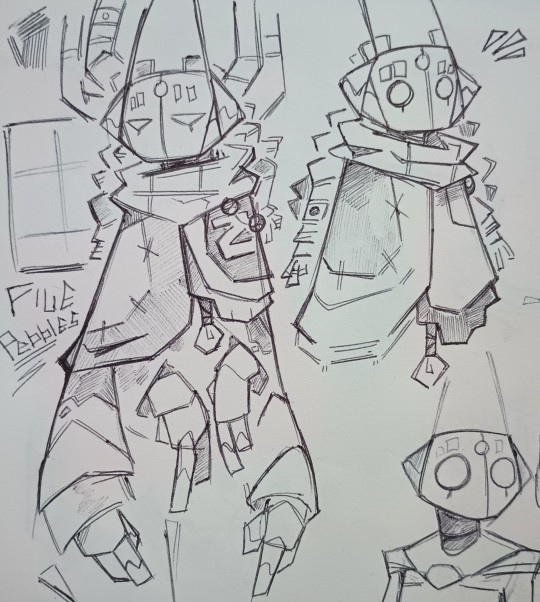
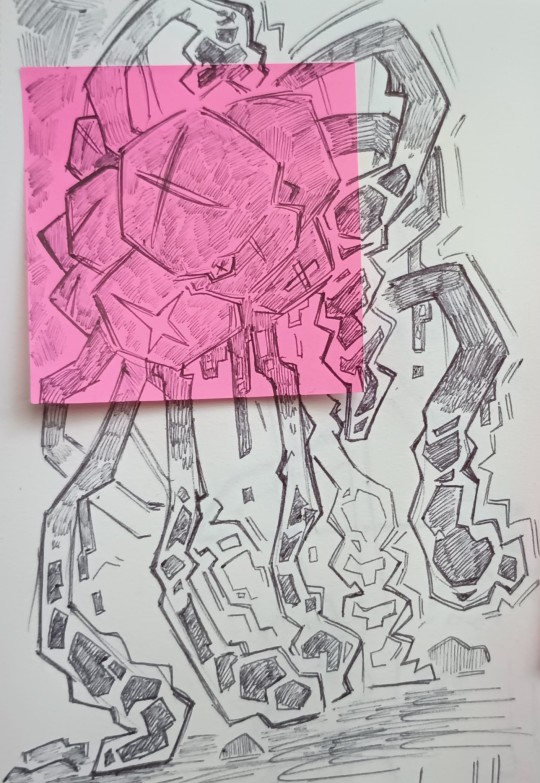


Miscellaneous Rain World Pens 💚
#rain world#rainworld#rain world five pebbles#five pebbles#rain world no significant harassment#no significant harassment#rain world survivor#my art#fanart#paper post#Hello all and welcome back to 'This character reminds me of Zacharie from OFF'#With NSH bring my latest victim 💚#May my future comparisons be merciful#Anyway it feels great to get back to pen works!!#How I missed it so 💚
1K notes
·
View notes
Note
A B I M for the alphabet!

⌘ 𝐓𝐇𝐄 𝐘𝐀𝐍𝐃𝐄𝐑𝐄 𝐀𝐋𝐏𝐇𝐀𝐁𝐄𝐓 || ( accepting. )


affection. ( how do they show love & affection? how intense would it get? ) in order to understand envy's perspective on such matters, it's imperative for my writing partners to read this particular headcanon of ' true love ' vs ' obsession ' here, as his actions & point of view towards said darling shall heavily vary on this sole factor at play. now, assuming that's been read, i'll just go ahead & answer the question: envy enjoys the physical aspect of affection far more than the verbal one, & it's not always in a traditional sense, such as hugs, kisses or sex. regardless if we are talking about mutual or unrequited love, envy has always been a dominant man & the long years spent in new eden have done nothing more than reinforce his desire to be assertive. as such, he can & often will subjugate his darling, let it be subtly or very, very roughly...
a small example of ' subtle ' love / affection: exploring their scars with slow, delicate touches, offering gifts meant to inconspicuously mark them as his property, writing love-letters, adapting to their personal preferences ( even extremes ), paying their bills, or whispering deliberate words in their ear which eventually will become engrained deep into their mind. a small example of ' rough ' love / affection: carving own name into their flesh, restraining them with handcuffs, ropes, killing anyone that gets in the way or the darling likes, including perfect strangers or relatives alike, isolating them from the world, forcing own fangs deep enough to leave ( near often ) permanent scars, as well as attempting to kill ' them ' due to a sudden surge of overwhelming feelings ( like burning jealousy or sadistic desire caused by pure infatuation ).
needless to say, while envy isn't typically violent towards his darling, his supposed love & affection can be suffocating, & sometimes, deadly.

blood. ( how messy are they willing to be when it comes to their darling? )
that's not even a question. as one of the most wanted serial killers in america, what are a few or a dozen corpses? for his darling, he will make sure the whole mississippi river runs red with blood should they merely ask, or if his own wicked mind conjures a reason. oh, may god have mercy especially on those who hurt or upset his darling in particular, for he most certainly won't. & trust me when i say this, dying would be a blissful thought in comparison to all the vile things he would have in store for them. after all, if he has patience to research thoroughly about his darling & their life, he will surely have just as much patience to research another & dismantle them like a toy ── bit. by. every. agonizing. bit.

ideals. ( what kind of future do they have in mind for / with their darling? )
the future is sole factor that even he isn't certain of, seeing how each night envy steps closer & closer to drowning in his own repeating dream, feeling something shift inside. changing. something terrible. a sense of humanity gradually slipping away like a handful of sand, but... with them? just one look into those eyes & he forgets, even as the sunlight begins to scorch, even as the hole inside grows deeper & deeper, making him yearn all the more for a heart that was promised at the end of this journey. to finally have a shot at a future, with them.
in truth, envy always wondered what it'd be like to have a proper home. a quiet place without a basement full of corpses or a garden with wilted flowers. just a normal, peaceful life with his grandmother & the precious darling, his knife underneath a blanket of dust.
or so the madman wishes, still following that thing's footsteps.

mask. ( are their true colors drastically different from the way they act around everyone else? )
yes, & no. with a hefty bounty over his head, envy naturally has to lie about his true identity ( often stealing those of his male victims, such as their names, id cards, phones, or even adapting their entire behaviour / look so long they are visually similar ), but otherwise, envy is pretty straightforward with the things he says or does. the only roadblock being his struggle with speech ── semi-mutism ── along those fleeting emotions. when he can't feel anything at all, which is the usual case, he will put up a mask accordingly & mimic whichever emotions & gestures are necessary for the current occasion at hand, especially in regards to his darling.
to put it simply, while he is generally honest with his intent, the affliction combined with his silent persona make it near impossible not to lie or at the very least pretend. well, unless there is something that he needs to keep hidden. plotting things tends to come with the territory when you are one of the most wanted serial killers.

#// i told myself that i would only write a small paragraph in every ask but here i am writing a freaking book lmao#i hope this paints a more vivid image of envy's perspective#thank you so much for the ask! ♡#headcanon ( envy )#🔪 ❝ ᵀʰᵉ ᶫᶦᵗᵗᶫᵉ ᵏᶦᶫᶫᵉʳ⋅⋅ ❞ {{ ;; ‘𝓔𝓷𝓿𝔂’ }}#tw: abuse
7 notes
·
View notes
Note
It looks like a lot of people here like to guess the story of this comic in the future, so I guess I might as well put my two cents in. I can't really think of anything super-clear in regards to plot and characters, but I'll be going off the content in the comic and this tumblr. I suppose I'll start with this "Monster Massacre".
It's pretty much confirmed that this is the result of Frisk attempting a No-Mercy route, but something went very, very wrong. As for where exactly, it's obvious that Frisk made it through the ruins, and Snowdin as well, with Papyrus all but explicitly stated to be dead, and most of the sentries presumably the same. I think it's in Waterfall where things start to get a little fuzzy. It's pretty heavily hinted that Undyne has a bigger part in the au, going by answered asks/posts, and the literal profile of the blog. She's mentioned by the Snowdin shopkeeper, as well as Doge in the asks. Now, Doge's response isn't too out of the ordinary, but the way the Shopkeeper phrases the dialogue in the comic is... strange. She says the previous Captain (Undyne) disappeared. BUT, Doge refers to Undyne in the past-tense, implying that she died. Now, we know that monsters dust when they die, and if we allow ourselves to think of Papyrus's grave and other graves in the underground area similarly to human ones, then, by that logic, Monster graves have their dust buried in them. Now, remember that the underground has just been attacked by a member of an enemy race who is currently slaughtering monsters left and right. If a monster were to disappear during/after that time, it's safe to assume that most people would have a fairly reasonable idea of what happened to them: Death. The possibility I'm trying to get at is, that after the chaos the human left behind, Undyne was (reasonably) declared dead, BUT her dust was never found. That's why the shopkeeper keeps it ambiguous about what actually happened to her. As for what did, well, that's where I believe the Something comes in. We also have an answered ask from Sans, confirming that the human didn't make it to Judgement Hall. Now, by the time Frisk reaches New Home, there aren't really any threats to them besides Sans himself, so it's unlikely they died there. that either leaves Waterfall, or Hotland. Hotland itself doesn't really present much trouble; the puzzles aren't too difficult (Remember, the human had to have at least reset once canonically to do No-Mercy), and Mettaton Neo... Well. That just leaves Waterfall. Now, let's get back to the theory of Undyne possibly not being quite dead. Some people might argue that Undyne the Undying doesn't dust, but melts. However, when she's killed, she still has a dusting animation and sound at the very end. Compare the amalgamates, who seem to frequently take the form of melted puddles and the like (A bit of an unfair comparison, considering one is dead and the other.... Not DEAD dead, but still). That means either one of two things: Undyne's dust might have been displaced after she died, or, she isn't dead... At least not fully. In Snowdin, we get a lot of talk about "The Something", a creature that appeared after the Monster Massacre. We don't know much about it, but it's a big enough deal for a search party to be deployed in Waterfall. This, along with an ask from Asgore about the something, referring to a "She" disappearing, leads me to believe that The Something is directly related to Undyne. It's hard to tell what exactly, but I think it's safe to assume The Something is the result of Frisk and Undyne meeting on the bridge in Waterfall. The details are pretty fuzzy, but it's certainly possible determination played a key factor in it. There are theories that it's a Frisk and Undyne amalgamation, which is certainly possible (Though that may give them power over resets/saves, so.). We also see Monster Kid on the bridge with the human in a hidden comic panel, so maybe he saw what happened.
As for other smaller theories I have: I think the Amalgamates will most definitely make an appearance, Since they technically can't die, so I think they'll be some closure there. Alphys might also make an appearance, but there are less... Favourable alternatives hinted. I have no idea about Mettaton, and it seems like Asgore won't hate Jack, but he'll still try to kill him anyway. As for the actual storyline, all I'm going to bet is that Jack is going to backtrack to Waterfall near the later half of the story, since The Something is theoretically directly related to Undyne and The Human, I don't think the story would do much with them until the climax, but that's just my guess. And that's all I got. Most of it is probably garbage, but I'd just thought I might as well give it a go. Either way, I love your comic, and I can't wait to see what comes next.

thank you anon very cool
9 notes
·
View notes
Text
In Which I Get Zooted (and Talk about Paradise Lost for some reason)
Part 2 (View Reblogs for Flavor) ->
I am reading Paradise Lost again. Jesus christ it is so good. The first time I read it I had to get used to Ye Olde Englifh Poetic Conventionf and didn’t do very well. Fortunately, I read lots of early modern English in the distant past—it’s like a language I’ve mostly forgotten. That means that repeated exposure has reopened the prose to me. Eventually, I’m going to have to pick up a book about John Milton himself, because there are definitely some alien theological and historical points whizzing right over my head.
I don’t know what it is about Paradise Lost. Reading Dante was painful outside the Hell part… Bunyan’s Pilgrim’s Progress makes me want to kick him in the pants. or die (Dante’s cuntiness goes a long way, that said)
But like every time Milton writes a Satan speech you just wanna do a fistpump. Just the most conniving, fascinating character. Every other fucker in the “good” section pales by comparison. Hell—I’ll just say it: all of the devils are beautifully written. They feel like real people. Half of the time, you’re nodding along with them, and there’s a point where you have to kinda look over your shoulder at Milton, like… buddy do you have any idea what you are SAYING.
The way that everyone talks about Paradise Lost, you’d think the whole goddamn text was about Satan. It’s not. Three of the ten books focus on Satan. All the others are about the war in heaven, Adam and Eve, or the Fall. Look here: if all we had were the books about Adam and Eve and God’s tried-and-true, this would still be great literature, but it’s greater because the stilted, proper characters clash against what are supposed to be our villains. We are literally being forced to ask the question: WHY do the devil and his minions sound like the people we’d rather know? If Milton’s God were real, I’d be straight-up scared of him, okay. I’d be in the “shit shit shit I hope he doesn’t see or think of me ever” camp.
Fun fact about Paradise Lost: people got mad at it for presenting the devil so well. They assumed that Milton was pro-devil somehow. This is because people have been bad readers since the beginning of time.
Milton is not pro-devil. He’s fallen into the problem that everyone has with writing God, which is: we have to explain why life, an extremely chaotic dumpster fire, is actually according to Divine Plan by a Big Guy Who Loves You! (Really!), but the more you try to explain the Plan the more you have to explain why God isn’t doing X or Y, until finally you have so many asterisks that essentially your religion is *teleports behind you*
So not only can no one read, no one can admit the real problem: how fucking shitty god and the angels are by comparison, and how they are, by all rights, being written correctly.
See, how ELSE could Milton have written God et al, that’s really the question. He does his best, and he’s very, very good at it. Look, I’ve read a LOT of religious texts over my life—and across the board, God is represented this way. CS Lewis wrote some wildly enjoyable fiction, but every time Jesus or God has to show up without the handy-dandy Aslan mask, everything stutters to a halt.
There are even points in the story where Milton has to tell you why what a devil is suggesting is sinful. For example, here’s the devil Belial giving his suggestions for how to deal with God now that all the devils are in Hell. So far, he has suggested not acting at all: God’s power is not only great in strength, it is great in cunning. He cannot be tricked; he cannot be beaten. So why not just wait it out? Don’t poke the tiger. Maybe the tiger will show mercy someday, if the devils don’t get used to the pain eventually:
“This horror will grow mild, this darkness light, Besides what hope the never-ending flight Of future days may bring, what chance, what change Worth waiting, since our present lot appears For happy though but ill, for ill not worst, If we procure not to ourselves more woe.”
Uniquely among the other devils—Moloch, Mammon, Beelzebub, and Satan all speak in this Book—Belial gets an addendum.
Thus Belial with words cloth’d in reason’s garb Counsel’d ignoble ease, and peaceful sloth, Not peace.
I can just imagine Milton reading it out loud to a friend and then that friend saying, “Hey, that Belial guy has the right idea!” and it’s like the tenth time that Milton has read this to someone only for them to look at him like, “Yeah, why not?” so Milton grumpily flops down at his rustic table with a quill and he’s grumbling about how everyone is a fucking idiot since he most clearly counsel’d IGNOBLE ease, and peaceful SLOTH, not PEACE, fuck thee, Thomas, thou slipshod bastard
In sharp contrast to Belial, Moloch—the first speaker—suggested fighting God until he just erased the devils from existence. Which is, you know, a mood.
It’s like the only way that you can represent god in fiction is as a one-dimensional cardboard cutout. The religious are terrified of judgment even while writing him and every time he shows up he’s boring and constipated. Of course we like the devil better: he’s more likely to give us a fair shake. God would fucking crush you like a beetle in slow-motion, ensuring you felt every pang, and he’d talk about how great he was the entire time he did it, and how he loves you, actually. Oh he loves you so much. There went your liver! Juiced. with love
So well are the devils written—so sensible, so motivated, so grounded—that the final devil to speak comes out of left field. Let me set the stage:
So far we had Moloch—future child-eater—suggest eternal war, with the aim of dissolution; Belial, who’s just like, why not chill and let the future bring what it may; and Mammon, who expands on that with “let’s actively seek ways to enjoy ourselves, altering everything around us until we form a world that meets our needs.” All of these devils focus on the pain of Hell, the loss of “bliss” (which I’m assuming is meant to imply both feeling and place: painlessness and Heaven, specifically), and the disgusting idea of returning to God, who they abhor.
Beelzebub brings up the idea of finding Earth, one tiny little planet that God made with a special creature called Man, and fucking around with it.
I had gotten so into the devils’ speeches—I was very zooted—that I had to do a double-take and then run back to re-read them.
“Bub, baby,” Belial should have said, “what the actual fuck are you talking about.”
Perhaps this is only me, but I couldn’t help but think of the vastness of creation, and the absolutely miniscule goal that the devils chose for themselves. The devils fell for nine whole days and nights, and Earth supposedly lies past dangerous voids and environments past understanding. It’s a big step down: go from fucking with the Creator to the Created, and not just any Created: some dumb human babies.
It’s the first break with the devils’ characters, and it doesn’t make a lot of sense.
to be CONTINUED.....
9 notes
·
View notes
Photo

I would like all my fellow Christian brethren to join me in using this moment to declare our faith in Father God Almighty and the LORD Jesus Christ and use our resolve to abide in Him daily. As Christians, we are aware of what may come our way since we choose to align ourselves with Him and His Holy Word. We do not consider our suffering for Christ any loss, thanks to our steadfast faith and trust in Him. And we thank Him daily that we can be a partaker of our duty to Him and we are promised a bright and glorious future with Him in His Kingdom.
The persecution, mockery, beatings, isolation and attacks we may face for being advocates of Jesus Christ and His Gospel will never gain any comparison to the glory of what is to come on the day of the Rapture, where we will receive new glorious bodies, free from infirmities and sin. It is because of this, we gladly go through all we go through, because we know that everything we face on this Earth is temporary. It neither adds nor removes to our promised eternal security in Christ. Our salvation as well as God and His Gospel Truth remains our top duty and ultimate priority and we should strive to boldly proclaim it, defend it, and be proud of it, no matter what the cost.
Thank Father God Almighty and the LORD Jesus Christ for His mercy and grace. May we all accept Him and His eternal gift of salvation and ask that He would transform our hearts and lives and give us a new direction according to His will and ways. Thank Father God Almighty and the LORD Jesus Christ for His Holy Spirit who saves, seals and leads us. May we always thank Father God Almighty and the LORD Jesus Christ for His almighty power and saving grace. For He is our strength, and He alone is able to save us, forgive our sins and gift us eternal salvation and entry into His Kingdom of Heaven.
May we make sure that we give our hearts and lives to God and take time to seek and praise Him and share His Truth with the world daily. May the LORD our God and Father in Heaven help us to stay diligent and obedient and help us to guard our hearts in Him and His Holy Word daily. May He help us to remain faithful and full of excitement to do our duty to Him and for His glorious return and our reunion in Heaven as well as all that awaits us there. May we never forget to thank the LORD our God and our Creator and Father in Heaven for all this and everything He does and has done for us! May we never forget who He is, nor forget who we are in Christ and that God is always with us! What a mighty God we serve! What a Savior this is! What a wonderful Lord, God, Savior and King we have in Jesus Christ! What a loving Father we have found in Almighty God! What a wonderful God we serve! His will be done!
Thanks and glory be to God! Blessed be the name of the LORD! Hallelujah and Amen!
23 notes
·
View notes
Text
https://www.reuters.com/investigates/special-report/usa-slavery-families/
Heirs of Power

The forebears of three members of Congress regained – and passed forward – wealth and power their families lost when slavery was abolished. Their success shows how the Southern elite exploited Black Americans in new ways.
About a month after the Civil War began, a slaveholding ancestor of current U.S. Congressman French Hill seemed confident about the future. “Lincoln can’t starve me out unless he takes my land and negros,” plantation owner Creed Taylor wrote to a relative.
By the time the war ended in 1865, President Abraham Lincoln had freed the enslaved, including at least 70 who worked Taylor’s cotton fields here. But Taylor’s family found a path back to prosperity that didn’t look much different from the way he had first made his fortune.

In May 1861, Creed Taylor wrote to his brother to explain his support of secession. Via Arkansas State Archives
Taylor still owned at least 1,500 acres of farmland. By the turn of the 20th century, his grandson oversaw a sprawling cotton operation that would eventually grow to more than 10 times the size of Taylor’s farm. And for years, the fields would be worked once again by Black people who didn’t have a choice.
Emancipation dealt many slaveholders a staggering economic blow, wiping out vast amounts of wealth across the South. In 1870, five years after the war ended and about 4 million Black people were freed from slavery, the states that once made up the Confederacy were enduring one of the largest wealth shocks in American history. The reported wealth of Southerners dropped by $4.3 billion, or about 65%, from a decade earlier, a Reuters analysis found. Put another way, war and emancipation appear to have erased about two-thirds of wealth in the South.
For this story, Reuters traveled to Arkansas and Georgia, and interviewed more than 20 experts on Southern history and economics. Journalists also used thousands of pages of newspaper accounts, census documents, court records, history books, family papers and other material to construct this story. The data analysis of the wealth shock in the South is based on a comparison of 1860 and 1870 census data from IPUMS.
Those who lost the most, like Congressman Hill’s direct ancestor, were the largest enslavers. They also had the clearest path to rebuilding – often by replicating elements of the slavery economy and reinstituting feudal systems that embraced white supremacy.
The Black people who had been enslaved emerged with far less. Racial violence and voting laws locked them out of political power. Schooling was limited, leaving most unable to read and write. The federal government let former slaveholders keep their land, and the newly freed were afforded few paths to prosper – leaving them once again at the mercy of the white elite.
In a report published in June, Reuters found that a fifth of the U.S. political elite – congressional members, living presidents, Supreme Court justices and governors – are direct descendants of slaveholders in America. Among the richest just before the Civil War were the forebears of three members of today’s Congress: Hill, Representative Dina Titus and Senator John Kennedy. Each had a slaveholding ancestor who was among the wealthiest 1% of Americans in 1860, Reuters found. By 1870, each of those forebears had lost between 60% and 90% of their wealth.
What remained, however, was land – and key social and political connections that, a 2021 study concludes, proved critical to the financial recoveries of the largest slaveholding families.
Such connections, Reuters found, helped the ancestors of Hill, Titus and Kennedy. In each family lineage, for example, at least two slaveholders or their descendants married descendants of other enslavers, pooling their assets and increasing their influence as they shaped the South’s postwar economy.
“The power of enslavers came not simply from their ownership of property, but from their ability to wield political power and from their clans,” said Steven Hahn, a professor of history at New York University who studies slavery, capitalism and the U.S. South.
Hahn said he believes that some lawmakers in both political parties benefit from advantages that stem from the slaveholdings of their ancestors. “And to this day,” he said, “their power and wealth can’t be dissociated from that.” Representative French Hill, Republican from Arkansas Representative Dina Titus, Democrat from Nevada Senator John Kennedy, Republican from Louisiana
In examining the lineages of Hill, Titus and Kennedy, Reuters focused on how their forebears reclaimed family wealth and power in the decades following the post-war Reconstruction era. It was a time when the old South sought to reassert itself socially and politically, stripping away the rights Black people had gained during Reconstruction before federal troops withdrew from the region in 1877.

Hill’s great-great-grandfather leased prisoners, most of them Black, to pick cotton and handle other farmwork for pennies a day in Arkansas. Unlike the people Hill’s ancestors enslaved, the prisoners represented labor without substantial investment.

A forebear of Titus married the daughter of a former congressman and slaveholder, and became a regional power broker in politics and real estate. In an address to state lawmakers, he explained that “in Georgia, the white race intended to dominate the negro race and control the government of the state, no matter how large the negro majority,” according to a newspaper account at the time.

And Kennedy’s ancestors expanded the family’s Louisiana land holdings through marriage and inheritance, then used poor Black farmers to work the land. Family estate records and an interview with a descendant of one of those farmers suggest the family used both sharecropping and tenant farming, which effectively kept some of their Black neighbors in debt.
As Black people were denied basic rights, the strategies used by the ancestors of today’s political elites illustrate key facets of the legacy of slavery in America. Taken together, they make clear how the descendants of some of the largest former slaveholders regained prominence and wealth by subjugating Black people in new ways after 1865.
“At the moment of emancipation and the end of the Civil War, when there could have been a massive redistribution of wealth to the people whose forced labor had created it, that did not happen,” said Heather McGhee, author of The Sum of Us: What Racism Costs Everyone and How We Can Prosper Together. “Instead the plantation class reorganized itself and the laws to ensure continued privilege – and privilege built on the exploitation of Black labor.”
Determining how much of a family’s money today came from an ancestral slaveholder is exceedingly difficult. Fortunes made through chattel slavery – or through the abusive labor practices in the decades after emancipation – were lost, built upon or divided among multiple heirs over many generations.
But more than cash wealth was passed down. Slaveholding had enabled families to buy land and invest in other industries. It allowed access to top schools for their children, giving their descendants entry into prominent occupations. And it helped them foster relationships with other leading families, building connections that reinforced their economic interests, said Joshua Rosenbloom, an economist at Iowa State University who has studied wealth before and after the Civil War.
“At the moment of emancipation and the end of the Civil War, when there could have been a massive redistribution of wealth to the people whose forced labor had created it, that did not happen.”
While the formerly enslaved were “essentially turned loose without any assets and had to support themselves,” the wealth accrued through slaveholding provided a cushion for white families that allowed them “to suffer short-run losses” but continue to take risks, he said.
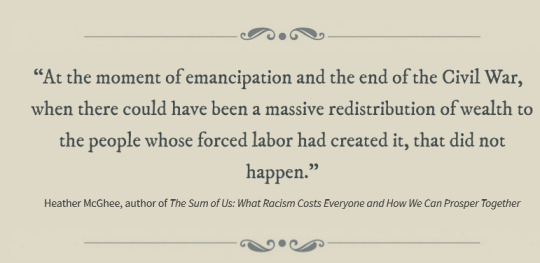
“We still have this notion of America as a land of opportunity,” Rosenbloom said. “Understanding the extent to which that’s true and the ways in which it’s constrained is central to understanding our own self-image and understanding how people succeed.”
In approaching the three lawmakers, Reuters asked about the ways their forebears regained their wealth and standing in the post-slavery South. “None of them bear any personal responsibility for the specific actions that their ancestor did,” said Douglas A. Blackmon, author of Slavery by Another Name: The Re-Enslavement of Black Americans from the Civil War to World War II. But in learning about the choices their forebears made, Blackmon said, the legislators should “consider what that history means.”
Neither Hill nor Kennedy commented specifically for this story. In June, Hill issued a statement for a previous Reuters story, calling slavery “a scourge” and saying “we as a nation must recognize our past, learn from it, and look to the future.” In 2019, Kennedy called slavery “reprehensible,” but noted: “I believe in personal responsibility, and I just don’t think someone today is responsible for what someone else did 150 years ago.”
For this article, Titus provided a statement: “Slavery is a deplorable part of our history, and I have no bonds with any long-dead relatives connected to it. We must not forget the cruelty visited upon Black Americans over generations as we commit to systemic reform that ensures equal rights for all. That principle has guided my personal life, professional career, and political record.”

The early childhood of John M. Gracie, an ancestor of U.S. Representative French Hill, was swaddled in the wealth produced by slavery. When Gracie was 4 years old, his father enslaved 11 people in New Gascony, Arkansas. Nearby, grandfather Creed Taylor enslaved 70. Combined, their estates would be worth as much as $119 million today – almost all of it in the value of their land and the Black men, women and children they listed as personal property.
After emancipation, the family retained its land. But who would work it? Gracie began experimenting with a variety of solutions after taking over from his grandfather in the 1880s, including using poor Black farmers and immigrant laborers from China.

But another option would prove lucrative, speeding the family’s path to greater prosperity and landholdings: leasing prisoners from the government.
Convict leasing involved paying the state or county for the use of prisoners, most of whom were Black. After Reconstruction ended, Southern legislatures enacted racist laws that diminished the rights of Black people and provided the pretext to jail them for petty transgressions. Often illiterate and struggling to make a living, they were ill-equipped to defend themselves in court or pay the fines that followed.
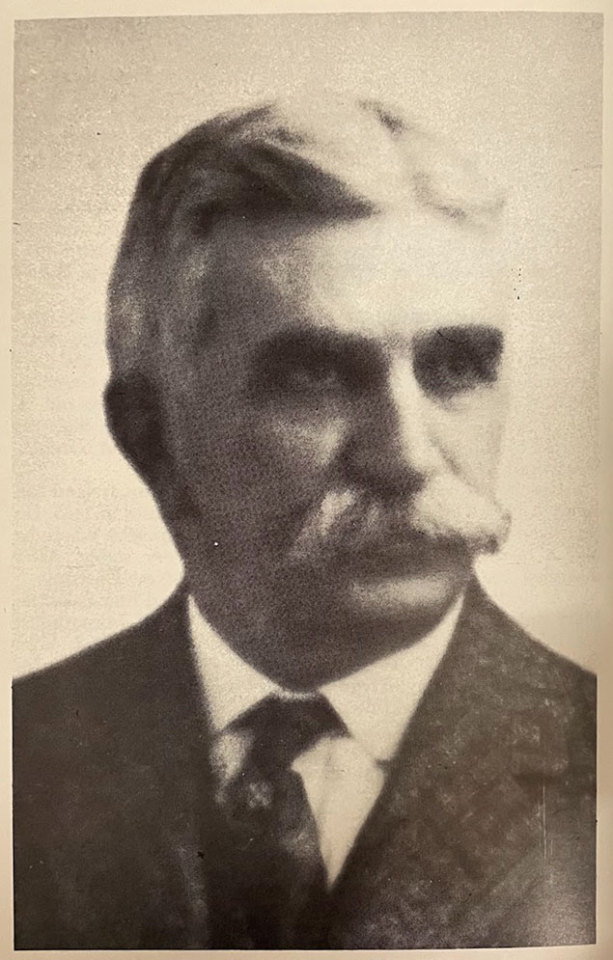
Cotton baron John M. Gracie, via The Jefferson County Historical Quarterly
Southern states used the system to address budget deficits and inadequate prison capacity after the Civil War, while providing a cheap and essentially disposable source of labor to the highest bidder.
“Convict leasing was a method of truly resurrecting something that looked almost exactly like the slavery that had existed before the Civil War,” said author Blackmon, who teaches at Georgia State University. “It was not typical for convicts to go back into the exact same kinds of plantation settings ... but Arkansas was a place where that did happen.”
Unlike purchasing the people Gracie’s ancestors enslaved, leasing prisoners didn’t require a substantial up-front investment for landowners. And if prisoners died doing the backbreaking work, others could quickly take their places.
Gracie signed contracts with local governments to use prisoners. They were housed on Gracie’s land, and the conditions were grim, according to newspaper accounts and government reports from the time. Men were whipped. Others died of heatstroke. One lost a foot to frostbite. At least a dozen prisoners, mostly Black men, lost their lives on Gracie land from 1890 to 1905, according to newspaper and state reports.
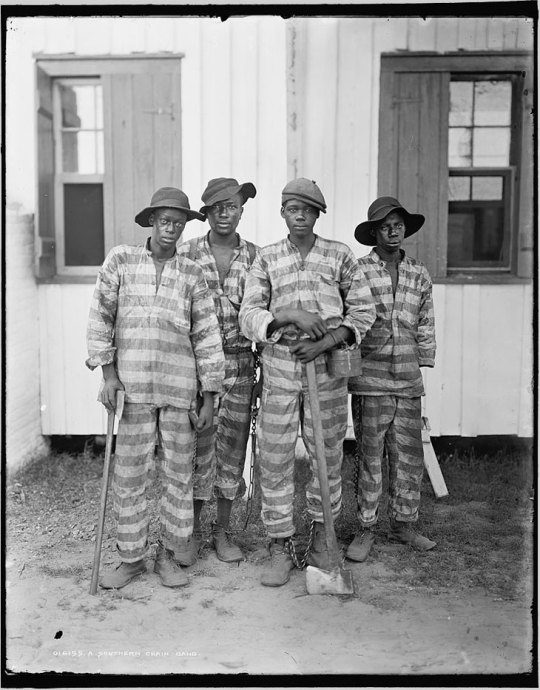
In 1888, for example, a state board reviewed a report by the penitentiary physician that examined the conditions at several prison labor camps. The report found 44 prisoners at a Gracie camp who, when not doing hard labor, were confined to a windowless pen measuring 20 feet by 20 feet. Ten years later, a Black man named Caesar Washington sued Gracie.
Washington had been pardoned by the governor of Arkansas, who noted his poor health. A petition presented by a government attorney mentioned, too, the fine and offense that put Washington on Gracie’s farm: $5 for “disturbing the peace by using profane and insulting language to a colored woman.”
In his lawsuit, Washington alleged that while serving on one of Gracie’s prison labor farms, he was “brutally beat, struck, whipped, kicked and maltreated.” The assaults were so bad, the 67-year-old shoemaker said, that he was left “wholly and permanently incapacitated from earning a living.”
Reuters could find no record showing how the suit against Gracie was resolved.
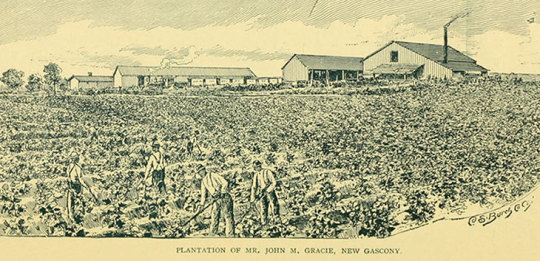
Amid similar allegations of mistreatment, Gracie thrived. He expanded the family’s farming operations, clearing thousands of acres of land around New Gascony and buying additional plantations near the Arkansas River. In 1908, news accounts said Gracie controlled 23,000 acres of land across multiple plantations and used as many as 250 prison laborers at a time.
Gracie’s precise profits are unclear. As of 1902, his contract with Pulaski County, for example, indicates he paid the local government 25 cents per day per prisoner, according to a newspaper account. Around the same time, the state of Arkansas’ own convict leasing operation, with a daily net cost of 27 cents per worker, produced a net profit of 48 cents – nearly twice as much as the cost of its labor.
After a 23-year run, Gracie ended his profitable business of using convict labor in 1909, as lawsuits and government investigations kept stacking up. In newspaper stories, Gracie had referred to the lawsuits by former prisoners as an “attempted hold up,” though he allowed that “it is impossible to handle a large number of convicts without sometimes resorting to somewhat extreme means in order to maintain discipline.”
But Gracie’s brutal practices didn’t affect his community standing. He was revered by white people in the Little Rock and Pine Bluff areas, where Gracie served as a senior executive for a bank and a railroad company. He supported local Catholic causes, helping to finance a school for Black children.
He and his family lived in Little Rock, in a Greek-revival mansion that he bought for as much as $7.6 million in today’s money. There, his wife and daughters threw parties for as many as 175 people, decorating with magnolia blossoms and Japanese lanterns.
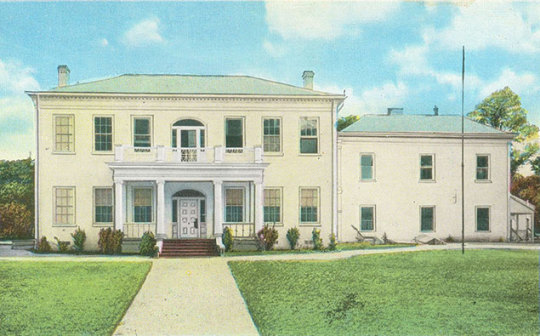
After he stopped using prisoners and Black tenant farmers, Gracie turned to Italian immigrants. But he soon soured on the Italian workers as “money mad” – they complained of debts they couldn’t work off and poor conditions, including holes in the floors of their cabins and rampant malaria. Many Italians left Gracie’s plantations. By 1918, several hundred Black tenant farmers once again worked his land, despite Gracie’s published comments years earlier in which he referred to Black laborers as “irresponsible, dishonest and very poor workmen” – a common racist trope.
His cotton empire began to crumble after prices crashed in 1920. Gracie would lose his farmland and sell the mansion in Little Rock. But in the lineage that leads to Congressman Hill, the family’s standing endured.
In 1924, Gracie’s granddaughter married another prominent Arkansan. Gracie died at the age of 76 in 1933 – the same year his granddaughter’s husband, James “Jay” Wilson Hill, established one of the first investment banking firms in the state.
Today, Gracie’s great-great-grandson is an accomplished member of Congress, representing Arkansas’ second congressional district since 2015. As a teenager, James French Hill worked summers at the family brokerage firm before attending Vanderbilt University. By his 30s, he was a U.S. Treasury Department official and a senior economic policy adviser to President George H.W. Bush.
In 1999, Hill helped found a Little Rock-based financial firm, Delta Trust & Banking Corp. Hill served as chairman and chief executive officer there.
Hill has shown a deep appreciation for history, describing himself as a ninth-generation Arkansan and serving as a commissioner for the Historic Arkansas Museum.
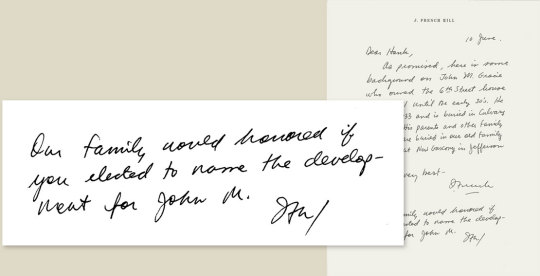
In 2011, when the former Gracie mansion was renovated with a loan from Hill’s Delta Trust bank, Hill wrote to the new owner. “Our family would (be) honored if you elected to name the development for John M,” the note read. It was.
In 2015, when Hill was sworn into Congress, he used a family Bible. It had been passed down from John M. Gracie’s father, a slaveholder.
Hill’s latest public financial disclosures show his net worth at between $10.3 million and $25.7 million, including his Little Rock residence. His holdings include a family investment vehicle with a name that echoes his family’s ancestral plantation: “New Gascony Company, LLC”.
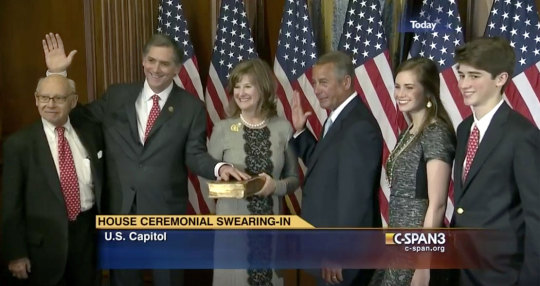
Powerbrokers and the Leisure Economy
In 1820, Francis Hopkins enslaved 183 people on his cotton plantation along the coast of Georgia. The son of a British naval officer, Hopkins also was a member of the state legislature. He is the great-great-great-great-grandfather of U.S. Representative Dina Titus – and the single largest slaveholder among the ancestors of America’s political elite identified by Reuters.
Titus, in her seventh term in Congress representing the state of Nevada, is the direct descendant of at least seven slaveholders, Reuters found. Five of those ancestors lived in Georgia, where Titus was born and raised.
After the Civil War, the son of Francis Hopkins reached out to the local branch of the Freedmen’s Bureau, the agency set up to assist the formerly enslaved during Reconstruction. Thomas S. Hopkins, who had also been a slaveholder, lodged a complaint, bureau records show. “The ‘Freedman’ on his plantation refuse to work,” it read, and “he wishes them removed.”
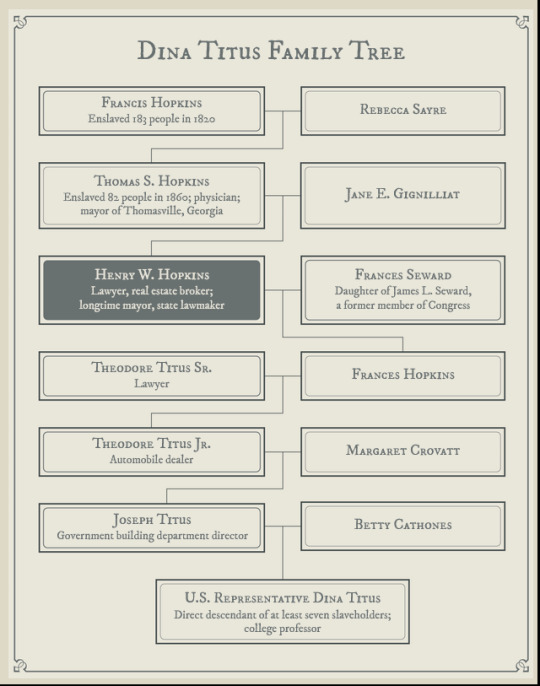
The message was a sign of things to come for the Hopkins family and the place they called home: Thomasville, a town in the deepest reaches of south Georgia.
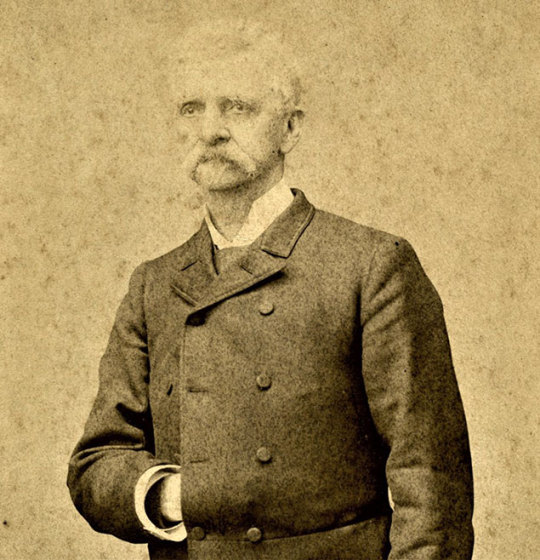
Thomas Spalding Hopkins, a physician, reimagined Thomasville as a place for those seeking relief from respiratory illnesses. Via Thomasville History Center
Many Southern landowners clung to farming, but this branch of the Hopkins family was largely forsaking agriculture. Thomas Hopkins was a physician, and by 1871 the mayor of Thomasville. Three years later, he presented a paper to the Medical Association of Georgia.
Dr. Hopkins contended that his town was the ideal place to recover from “consumption,” as tuberculosis was then called. In an 1882 letter published in the Atlanta Medical Register, he extolled the virtues of Thomasville’s “dryness of the climate” and the city’s distance from the Atlantic Ocean and the Gulf of Mexico, with their dangerous “saline vapor and moisture.”
His pitch, made through travel advertisements and testimonials to medical journals, effectively rebranded Thomasville as a destination for the ailing. The city was highlighted in a Harper’s magazine article in 1887, which described it alongside winter resorts that included the south of France, Switzerland and the Adirondacks.
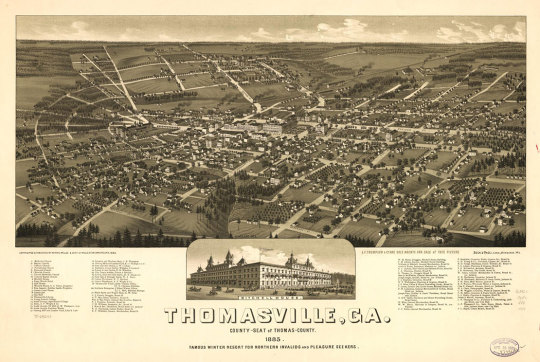
The son of Dr. Hopkins continued those efforts. But as Henry W. Hopkins himself became a prominent political figure, he used the family name and influence to launch an even greater transformation of Thomasville – one that in some ways capitalized on recreating elements of the antebellum South.
Often referred to as Judge Hopkins for one of the many offices he would hold, Henry married the daughter of a former U.S. congressman, who had also been a slaveholder. For parts of five decades that followed the end of Reconstruction, Judge Hopkins was one of the most influential men in the region.
From the mid-1880s through 1900, Hopkins spent nine terms as Thomasville’s mayor. When he wasn’t at city hall, he served in the state legislature – for 17 years between 1894 and 1926. Family papers reviewed by Reuters show Judge Hopkins traded favors with newspaper editors and politicians. He helped wealthy Northerners and Midwesterners, including Standard Oil heirs, acquire land, then hosted elaborate hunting trips. In the off-season, he often managed the plantations they bought.
In and around Thomasville, he built a social dynasty by brokering the sale of these plantations to monied outsiders, drawn to hunt quail and experience the old South.
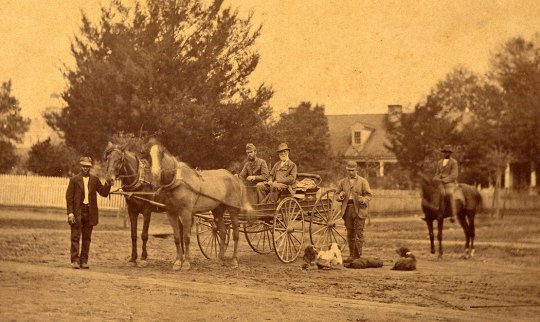
Southerners like Hopkins “basically ran these places like their fiefdoms,” said historian Hahn. “And poor white people and poor Black people were expected to bow down to them.”
These were “big families who wielded an enormous amount of patronage and either occupied local offices or had clients who did,” he said.
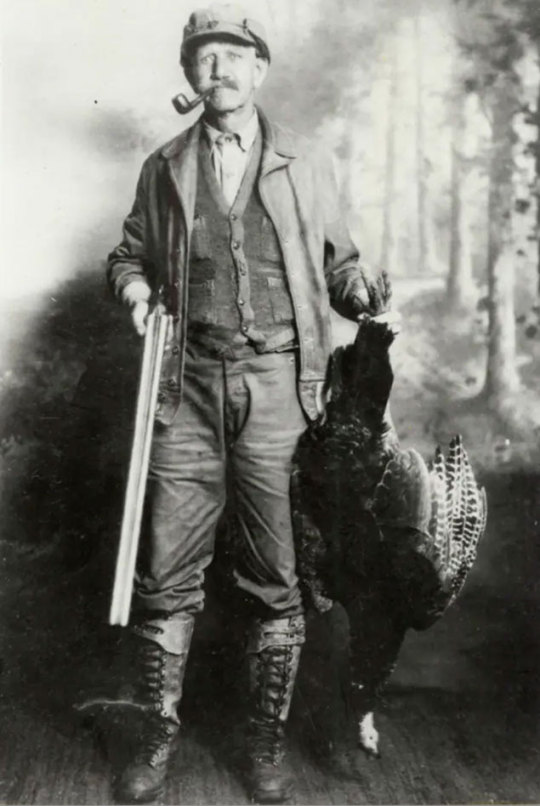
Through his law firm and real estate brokerage, Judge Hopkins “compiled, and eventually sold, almost every one of the original plantations that now are such a wonderful part of our southern life,” according to a book written by his great-grandson.
In the world Judge Hopkins helped create, the old plantations became country lodges. Well-to-do white people attended Christmas fox hunts and “fancy dress” balls where they danced the Virginia reel. Black families worked on those properties as servants and hunting guides. Part of the allure for some Northerners came in touring the homes of the county’s poorer Black residents.
“When it becomes clear that there is interest in vestiges of the old South … there’s a real sense that you can sell this,” said Julia Brock, a history professor at the University of Alabama who co-wrote a book about Thomas County and surrounding areas.
“There was a real interest in Black life,” Brock said. But that interest was in the nostalgia of the antebellum South, “not Black life as it was emerging into freedom.”
The economic success of the country-lodge plantations recaptured some of the Hopkins family���s standing as “part of a gentry,” Brock said, conferring upon him “a central place in a new social world.”
The system that now offered leisure for the wealthy still depended on Black labor, from tending dogs to driving carriages to serving supper to making sure quail nests were safe from natural predators.
It was “a feudal-type thing” for Black people, said Titus Brown, a history professor at Florida A&M University.
Brown, who co-wrote a book built around interviews with former employees of area plantations, said working on the leisure plantations was like living in a bubble. That leisure economy provided Black families with jobs and other benefits, including medical care and access to education. And it granted them “some protection, as long as they are not violating the social conduct or etiquette,” Brown said.
Judge Hopkins’ life and livelihood exemplified the nature of that social contract.
After a school for Black students burned down in a neighboring county, Hopkins donated land for a new location in Thomas County. He also connected Black people whom he knew to the white families who owned the plantations, recommending them for plum jobs.
But Hopkins had also been an early member of the Ku Klux Klan, and he sought to reassure white people that his vision for the region wouldn’t upset their primacy.
In 1905, for instance, state lawmakers debated whether to create a new county by peeling land from Thomas County and an adjacent county. Critics argued doing so would give Black residents an electoral advantage in two of the counties. Hopkins favored the move, and he testified before state lawmakers. According to The Atlanta Constitution, Hopkins “devoted his time to answering the argument of the opposition relating to negro domination,” and “closed with an eloquent reference to the fact that in Georgia the white race intended to dominate the negro race and control the government of the state, no matter how large the negro majority.” Judge H.W. Hopkins, an avid hunter, helped turn plantations into country lodges. Via Thomasville History Center
Judge Hopkins was in his 80s when sociologist Arthur Raper visited Thomasville in the early 1930s. Raper sought to explore the reasons behind lynchings in America, and two had taken place in Thomas County in 1930.
In one case, a Black man was accused of attacking a 9-year-old white girl. The man was jailed, and a mob gathered. When authorities tried to move the man to a different location, the mob wrenched him from the sheriff and told the man to run. Then they shot him repeatedly from behind.
The mob tied the man’s body to the back of a car and dragged him through town, his corpse almost hitting a pedestrian, Raper wrote. The killers did not bother covering their faces, according to Raper’s account. Still, no one came forward to identify them.
Raper wanted to learn more about the leaders of a town where such a thing could happen. Among those he interviewed was Judge Hopkins.
Hopkins and other leading citizens of Thomas County, Raper wrote, saw themselves as above poor white people. The sociologist referred to them as the “local landed aristocracy” and wrote of their paternalistic attitude toward Black people. Raper paraphrased it as: “Why you know, that fellow’s grandmother belonged to my mother’s father.”
Hopkins, he wrote, called lynchings the work of lower elements of white society: “I’ll give anybody a thousand dollars who’ll find either a son or a grandson of a slaveowner participating in a lynching.”
Raper found that Hopkins had once been a member of the Klan – using the phrase “the original Ku Klux Klan.” He was referring to the group’s first incarnation, when the Klan rose during the federal occupation of the South in the Reconstruction years. Writing in 1932, Raper said Hopkins had recently declined to join the reconstituted Klan.
Hopkins’ great-grandson later wrote of watching Judge Hopkins meet with “a group of hooded and sheeted figures” assembled on the lawn. They had come to ask him to “join in some sort of mission or action.” Judge Hopkins, according to his great-grandson, told the men to contact the police if a law had been broken. Otherwise, Hopkins told them, “you men must go home and hang up your robes for good.”
Judge Hopkins had no need to circumvent state power. He and others like him now were in control. Hopkins lived into his 90s, dying in 1945.
His great-great-granddaughter, Dina Titus, was born in Thomasville and grew up in Tifton, a town about 50 miles to the north. She graduated from the College of William and Mary, earned a master’s degree from the University of Georgia, then got a doctorate at Florida State University. She taught government for more than 30 years at the University of Nevada, Las Vegas.

Like her forebears, she pursued a career in politics. In 1988, she was elected to the Nevada State Senate, where she served as Democratic minority leader for 15 years. In 2008, she was elected to Congress.
Disclosure forms and real estate records show her net worth at between $978,000 and $2.5 million. The median U.S. family had a net worth of $193,000 in 2022, according to a survey for the Federal Reserve Board.
The Paralyzing Debt of Sharecroppers
The farm fields of Catahoula and Concordia parishes made white men rich and Black men miserable for many years in central Louisiana. Fed by a sprawling set of waterways, Concordia’s floodplains turned into what some call “million-dollar soil,” sprouting rows thick with cotton that were flanked by towering plantation homes.
Central Louisiana is where the ancestors of U.S. Senator John N. Kennedy came to secure their fortunes. In 1840, less than 30 years after Louisiana became a state, Kennedy’s great-great-great-grandfather enslaved 120 people in Concordia Parish. His estate in 1860 was worth about $57 million in current day dollars. His ancestor’s brother, a farmer and politician, enslaved 55 people on his Mississippi land in 1860. He then used cash from that estate – worth some $68 million in today’s dollars – to buy nearly 1,800 acres in neighboring Catahoula Parish.

After the Civil War, when the Black people they had enslaved were freed, the forebears of Kennedy were never again as rich. But they remained monied and powerful – a lineage of doctors, politicians and landowners surrounded by poor Black families.
Marriages between the descendants of slaveholders further grew their holdings. Among the senator’s direct ancestors was his great-grandfather, Leonidas Calhoun, who controlled large swathes of land along or near the Mississippi River Delta.
Calhoun went to medical school in Kentucky in the 1880s, then returned to live on a family plantation in Catahoula Parish. From there, he practiced medicine and oversaw hundreds of acres of farmland in Catahoula and adjacent Concordia Parish. He died in 1903 at age 44.
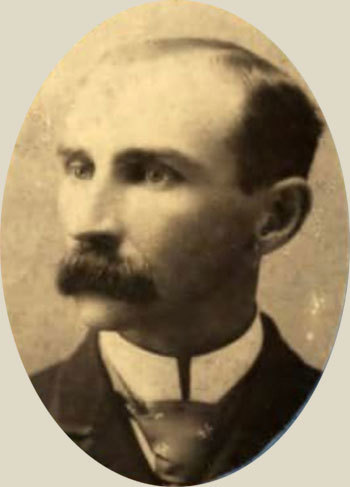
Portrait of Leonidas Calhoun. Via Facebook
At the time of his death, estate records examined by Reuters suggest that the Calhoun family was both sharecropping its land and also renting out larger tracts to tenant farmers.
In sharecropping, landholders typically gave farmers the right to live on and farm their land in exchange for a portion of the crops they produced. Farmers – those around the Calhoun land were typically Black and illiterate – often needed credit from their landlords simply to put a crop in the fields. Owners would front them everything from food and clothing to seeds and tools, typically provided at inflated prices and sold at stores on the plantations themselves.
After harvest, whatever was borrowed was deducted from the sharecropper’s earnings. In bad years, many may have owed more than they earned. Until those debts were repaid, laws forbade sharecroppers from leaving.
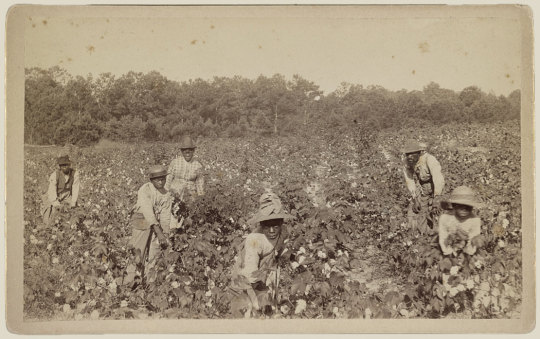
“During the end of the year, when it’s time for settlement, (landowners) would then pull out these accounting records to say, ‘Oh, you and your family almost made it out of debt,’” said Cassie Sade Turnipseed, a history professor at Jackson State University who has studied sharecropping in the Mississippi Delta.
Using the appraisal of Calhoun’s assets and matching them with census records, Reuters identified at least two Black farmers who owed Calhoun money at that time.

One was Granville Swift. Records show he owed $20 to Calhoun, and the debt was already at least six months past due. The 1900 census shows that Swift, a 23-year-old Black farmer, lived with his 22-year-old wife, who was a farmhand. Both were illiterate. Swift is also listed as a farmer in Catahoula Parish in the 1910 census, and records indicate he died there in 1918, at age 42. Reuters could find no evidence that he ever owned any of the land he farmed.
Another Black farmer who owed Calhoun money was Ben Polk. His debt was $5, according to estate records. The 1900 census for Catahoula Parish shows 49-year-old Benjamin Polk. He was listed as the head of a household with 10 other mouths to feed: his wife, eight children and one grandchild.
At some plantations, the owners issued their own scrip for use at their stores. Turnipseed, the scholar of sharecropping in the Mississippi Delta, said this meant that, even in profitable years, sharecroppers were unable “to acquire any kind of wealth because your currency would only be honored in very limited ways” on the plantation.
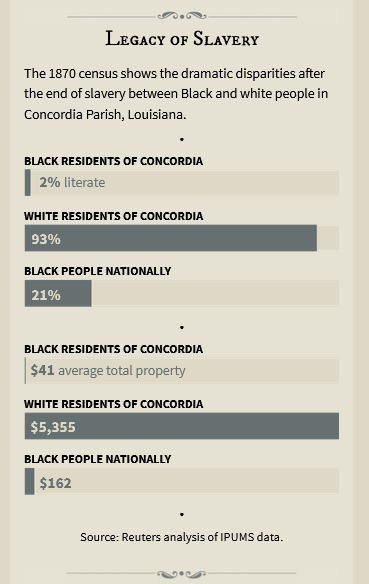
In an interview with Reuters, Ben Polk’s great-granddaughter recounted her ancestors’ description of working the Calhoun land.
Men in the family labored “sun up to sun down” in the cotton fields and had little autonomy, said Bettye Johnson, now 75. She said they were forced to buy food and goods on credit and at inflated prices in a plantation general store. Their debts often dwarfed their earnings, Johnson said.
“It was the Calhouns’ place,” Johnson said, “and they were in charge.” In the 1930 census, the occupation for Leonidas Calhoun’s son, who inherited the family land, was listed as “overseer” of a plantation.
The struggle to earn a living was intensified by violence and racial animus, some that was chronicled by the Calhoun family itself.
Legacy of Slavery
The 1870 census shows the dramatic disparities after the end of slavery between Black and white people in Concordia Parish, Louisiana.
During Reconstruction, Black residents of Concordia Parish gained power at the voting booth.
In 1860, about 91% of people living there were counted as “slaves,” the third-highest percentage of any county or parish in the United States, according to data from a recent study. After emancipation, Black people outnumbered white people in the parish 9,257 to 720.
Those figures underscore how important slavery was to families including the Calhouns, and how different the post-slavery political landscape became during Reconstruction. In the 1870s, Black men in Concordia were sheriffs and district court clerks. A formerly enslaved man was elected to the state legislature and then founded a newspaper.
A book by a local historian named Robert Dabney Calhoun, a nephew of Leonidas Calhoun, provided a window into how at least some local white people viewed those results. Black officeholders, Robert Dabney Calhoun wrote, were “illiterate, dishonest and sweating” men who carried out “unscrupulous designs.”
“Our substantial citizens were forced to engage in election manipulations,” wrote Calhoun. “They prayed for the dawning of the new day of white supremacy.”
That is what the white people of Concordia and surrounding parishes established for decades, by unleashing a deadly campaign in the 1870s.
“Lynchings, massacres, and terroristic intimidation was absolutely central to how many plantation dynasties reasserted dominance,” said John Bardes, a history professor at Louisiana State University, whose studies focus on slavery in Louisiana. “It was just horrific spasms of violence all throughout the state.”
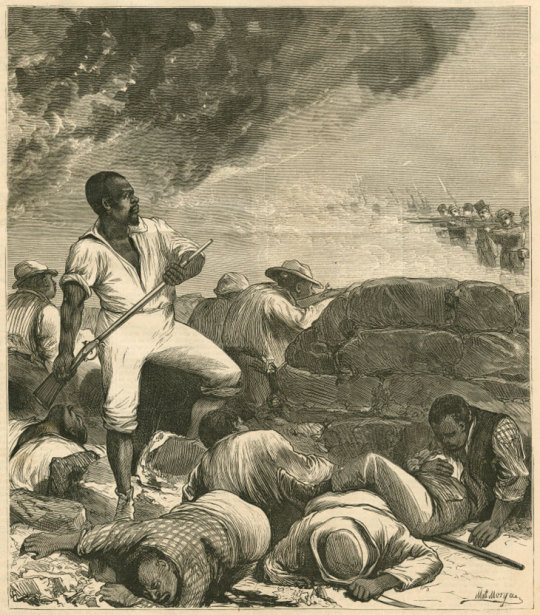
A recent report by the The Equal Justice Initiative found that Louisiana ranked third in the nation between 1877 and 1950 in what it terms “racial terror lynchings” – killings that were “acts of terrorism” outside of any legal proceedings. The state had 549 such murders in that period, the group found.
Around the time Leonidas Calhoun took control of the land in Concordia and Catahoula parishes, white people across the South had succeeded at reasserting political dominance. Another report by the Equal Justice Initiative notes that, “from 1885 to 1908, all 11 former Confederate states rewrote their constitutions to restrict voting rights using poll taxes, literacy tests, and felon disenfranchisement.”
Near the turn of the 20th century, changes in Louisiana tightly restricted who could vote. In 1897, before the changes, state records show 164,088 registered white voters and 130,344 registered Black voters. After the changes, records show 125,437 registered white voters and just 5,320 registered Black voters in 1900. The year after Leonidas Calhoun died, the number of registered Black voters across all of Louisiana had dropped to 1,718.
Today, the great-grandson of Leonidas Calhoun is the junior U.S. senator representing Louisiana. John Neely Kennedy – his middle name is the surname of two of his slaveholding ancestors – was president of his senior class at Vanderbilt University. He graduated from the University of Virginia School of Law, and earned a degree in civil law from Oxford University in England. Before being elected to the Senate in 2016, he spent five terms as Louisiana’s treasurer.

Real estate records and Kennedy’s latest public financial disclosures show his net worth is between $8.3 million and $22.6 million.
Kennedy doesn’t live in either Concordia or Catahoula parish. But after his mother died, he was named as one of the inheritors of her estate. Among her possessions listed in a 2005 probate document was hundreds of acres in Catahoula – family land that once belonged to one of Kennedy’s slaveholding ancestors.
Slavery’s Descendants
PART 1
America’s Family Secret
INTERACTIVE
Explore The Ties To Slavery
PART 2
“The Slaves Built That”
PART 3
“All We Are is Memory”
PART 4
American Dreams
PART 5
The Crown, the Cabinet and the UK’s Legacy of Slavery
PART 6
Heirs of Power
7 notes
·
View notes
Text
The Words - The Thirty-first Word - Part 44
Second comparison: Suppose we are trapped at night in a desert sand- storm. We cannot see even our hands and are hungry, thirsty, hopeless, and exposed. Just then, someone appears unexpectedly with a car and takes us to a Paradise-like place, where an extremely merciful lord welcomes us and extends his protection to us. Our future has been secured, and a banquet has been prepared for us. You can well imagine our great happiness.
The desert is the world, and the sandstorm is the violent disturbances of time and events. All of us are anxious about our future. Since we look at it through the view of misguidance, we see it in a thick darkness. No one we know can hear our cries. Moreover, we are very hungry and thirsty. But thanks to the pillars of belief, ways of worship and principles of good conduct that Prophet Muhammad brought as a fruit of the Ascension, the world is the guest-house of an extremely Munificent One and we are His guests and officers. In such a guest-house, the future appears as beautiful as Paradise, as lovely as mercy, and as brilliant as eternal happiness. Given this, understand how lovely, pleasant, and beautiful that fruit is.
The unbeliever remarks: “Boundless praise and gratitude be to Almighty God! I am convinced and reject my unbelief. I am a believer.” We congratulate you, and may God Almighty include us in His Messenger’s intercession.
O God, bestow blessings from the beginning of the world until the end of the Day of Judgment, on him by whose sign the moon split, and from whose fingers water gushed forth like the spring of Paradise; who made the Ascension and whose eyes did not swerve— our master Muhammad, and on his Family and Companions.
All-Glorified are You! We have no knowledge save what You have taught us. Surely You are the All-Knowing, the All-Wise.
O Lord, accept from us (all our good deeds); surely You are the All- Hearing, the All-Knowing. Our Lord, take us not to task if we forget or make mistakes. O Lord, do not let our hearts swerve after You have guided us. O Lord, complete our light for us and forgive us. Surely You have full power over all things. The conclusion of their call will be: “All praise and gratitude are for God, the Lord of the Worlds.”
#allah#god#islam#muslim#revert#reverthelp#reverthelp team#convert#new revert#new convert#new muslim#muslim revert#muslim convert#welcome to islam#revert to islam#convert to islam#how to convert to islam#prophet#muhammad#quran#sunnah#hadith#dua#pray#prayer#salah#help
3 notes
·
View notes
Note
Don't you worry about rambling my man, that's what this here tumblr is for! Those are some really good points! I think as well, for Shuri to go to war in her mother's name, not only would be an insult to her mother's love, but Ramonda didn't raise her to be like that. She was raised to be quote unquote "womanly" as at the end of the day *thinks of at the end of the day from les mis* she is a princess and how are princesses supposed to behave? Demure, compliant, "womanly" ie, the complete opposite of Shuri. We see this mainly in the first film, with Shuri giving the middle finger, Ramonda warns her, Shuri wanting to get out of her traditional dress before the waterfall fight. Given that she's mainly into STEM, it makes sense that those take priority over being the "traditional princess" so when she has to be the "traditional princess" with the dresses, the calm, etc, that's not comfortable for her. However, she is still aware of her mother's influence and given Ramonda's personality, I wouldn't put it past her to be complaining about how Shuri isn't behaving like a "proper princess" in the ancestral realm.
Also I think I have a good summary of what you said - it's all about the greater good!

these are very interesting points about shuri's upbringing under ramonda. I would say that wakanda has different viewpoints on what is "womanly" in comparison to the rest of the world, with the most obvious example being the dora milaje. being a dora is a great honour, reserved for wakanda's greatest warriors and is one of the most important jobs (protecting the royal family) -- in any other country, comparable positions would be occupied by men. does that speak to a larger cultural opinion of women in wakanda? im not sure, but i'd like to think so!
perhaps what ramonda is doing during these instances is not reminding her of being "womanly" per se, but more of traditional etiquette. in the context of our (or western?) society, "traditional etiquette" and "womanly (i.e. demure, reserved, compliant)" may be one and the same in women, but in wakanda, they could mean different things. like, t'challa compared to shuri is much more stoic and reserved -- this could be his nature, but it could also be because he's the firstborn and was always going to inherit the throne, so these qualities were taught to him because that is what is expected in kings, as per tradition. and tradition, respect of elders and the ancestors is deeply embedded into wakandan culture, so it would make sense that the top most position of the country (one that is deigned to be representative of the country and its peoples) is reflective of that. maybe ramonda wasn't telling shuri that she wasn't behaving correctly as a woman, but as royalty. im sure she would have tsk'd t'challa if he flipped someone off as well -- but I can't picture him doing that at all hahaha
and yes -- ultimately my last answer was a really long-winded way of saying it's for the greater good! but i'd like to think that shuri showed namor mercy not just for the sake of wakanda's future and her responsibility as its princess and black panther, but also because she loved her mother so much. violence begets violence -- letting namor's hatred fuel her own would only lead to more down the road, and i think ramonda's love for shuri is part of what broke that cycle, even if that same love is what started her down that path to begin with. namor loved his mother just as bad, and when he lost her, his heart broke into something sharp and hateful -- he wielded that hate, bludgeoning the surface and laying waste to his enemies. he let that grief shape him into something furious. but ramonda teaches shuri that while grief is difficult, yes, it can be survived. it is just love, reincarnated. imo, ramonda was watching her from the ancestral realm, praying that her death didn't break her daughter into something unrecognizable, and hoping instead that shuri would take her sorrow and seed it, nurture it into wisdom and love to share with the future.
#marvel#black panther: wakanda forever#ask#again sorry for rambling!#bpwf is a love story after all#we are an amalgamation of every moment we have shared with the people we love#we are memories made flesh and blood -- we are more than the worst things that have happened to us!
2 notes
·
View notes
Text
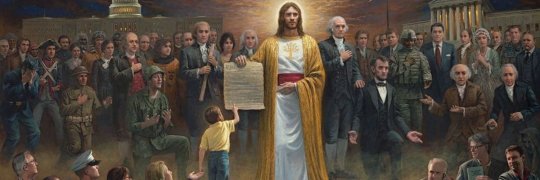
Daily Devotionals for October 16, 2024
Proverbs: God's Wisdom for Daily Living
Devotional Scripture:
Proverbs 26:13-14 (KJV): 13 The slothful man saith, there is a lion in the way; a lion is in the streets. 14 As the door turneth upon his hinges, so doth the slothful upon his bed. Proverbs 26:13-14 (AMP): 13 The sluggard says, there is a lion in the way! A lion is in the streets! 14 As the door turns on its hinges, so does the lazy man (move not from his place) upon his bed.
Thought for the Day
The slothful man's movements take him nowhere and accomplish nothing. A comparison is made between a door that swings slowly on its hinges and a person who turns over and over in his bed but never leaves it. Laziness, fear, or depression keeps him there. Fear is a cruel master, and the people's fears are many. Some fear death, illness, or losing loved ones. Others fear a car wreck, or that the plane they take may crash or be hijacked. Many fear the future. Others are tormented by a fear of the dark or of being alone. Some fear being molested or raped. Fear is tormenting whatever form it takes, driving some people to act foolishly and even incapacitate them because they are ruled by their fears.
Fear is the opposite of faith. There is only one way we can live without fear in a world of turmoil, war, and uncertainty - to trust the One who told us not to be troubled or fearful. The Lord calls us to trust Him and walk in faith. The devil continually tries to make us do the opposite; to be afraid and doubt God. Only through His power can we walk in peace and safety. We must give our lives completely to Him and yield to His will. Making a total commitment to God means giving Him first place in every area of our lives - our time, our money, our careers, our families, and our futures. Those who entrust themselves to Him in this way will never be shaken in the day of trouble. "He shall not be afraid of evil tidings: his heart is fixed, trusting in the LORD" (Psalm 112:7).
The Bible speaks of our times as the "last days," during which great trouble will occur. "This knows also, that in the last days, perilous times shall come" (2 Timothy 3:1). Instead of overcoming fear, many will be overwhelmed by fear. "And there shall be signs in the sun, and in the moon, and in the stars; and upon the earth distress of nations, with perplexity; the sea and the waves roaring; men's hearts failing them for fear, and for looking after those things which are coming on the earth: for the powers of heaven shall be shaken..." (Luke 21:25-26).
Fear is a horrible monster no matter what form it takes. We can ask God to deliver us and give us the courage to overcome whatever frightens us. Fear and weakness should have no power over a Christian, for "God hath not given us the spirit of fear; but of power, and of love, and of a sound mind" (2 Timothy 1:7). "Strengthen ye the weak hands, and confirm the feeble knees. Say to them that are of a fearful heart, Be strong, fear not: behold, your God will come with vengeance, even God with a recompense; he will come and save you" (Isaiah 35:3-4).
Prayer Devotional for the Day
Dear heavenly Father, thank you that we can overcome the threat of fear through our faith in You. It is so wonderful to walk in peace and faith when trouble surrounds us. Lord, you have never failed me in the past and I know you will not fail me now. You are so faithful and I am grateful for Your mercy and love over and over again. Help me to overcome the lies of the devil that would try to get me to doubt Your love and provision when I am facing a need that seems overwhelming. I voice my trust in You and thank You, even before I receive the answers to my prayers. I pray in the name of Jesus. Amen.
Good Morning World From: Steven P. Miller, @ParkermillerQ, gatekeeperwatchman.org TM Founder and Administrator of Gatekeeper-Watchman International Groups. Jacksonville, Florida USA, Tuesday, October 15, 2024, X … @ParkermillerQ, #GWIG, #GWIN, #GWINGO. https://www.facebook.com/gatekeeperwatchnan https://www.facebook.com/ https://www.facebook.com/groups/Sparkermiller.JAX.FL.USA Instagram: steven_parker_miller_1956
1 note
·
View note
Text

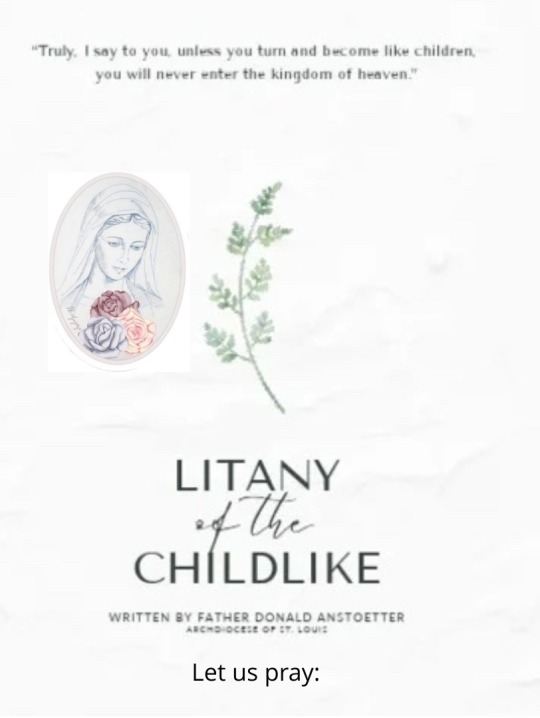


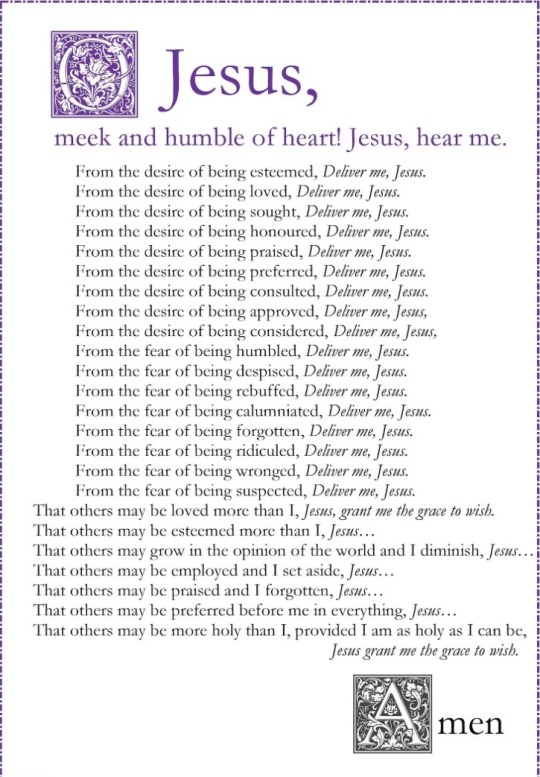
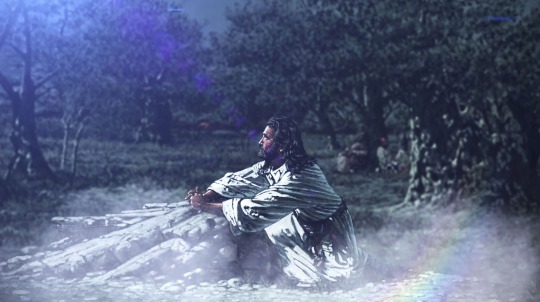

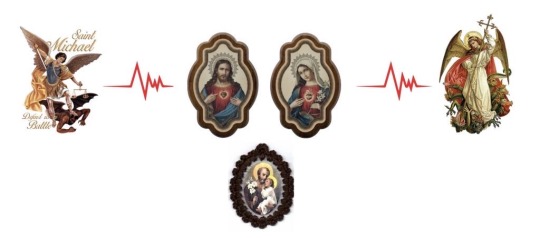

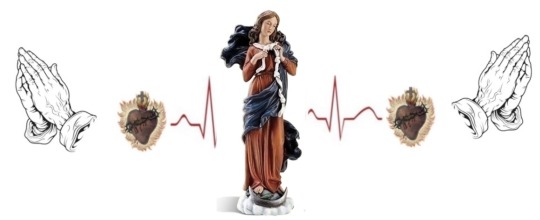
LITANY FOR HEALING
Jeremiah 17:14
Lord, the brokenness of the world is known to you.
No pain, suffering, grief, or regret is hidden from your eyes.
Heal us, O Lord, and we shall be healed;
Save us, and we shall be saved.
Our prayers are not merely for physical well-being,
But also for consolation, renewal, and hope.
Heal us, O Lord, and we shall be healed;
Save us, and we shall be saved.
We lift up our sisters and brothers, our enemies, strangers in our midst.
We pray for the nations of the earth and the whole of your creation.
Heal us, O Lord, and we shall be healed;
Save us, and we shall be saved.
We offer to you a sacrifice of open hearts and minds,
Prepared to be found by you in unexpected ways and places.
Heal us, O Lord, and we shall be healed;
Save us, and we shall be saved.
We do not dare to pray out of a sense of our own worth,
But our cries come from the depth of the body of Christ.
Heal us, O Lord, and we shall be healed;
Save us, and we shall be saved.
We have come in a spirit of prayer-
To wrestle, to plead, to summon, to advocate, to receive.
Heal us, O Lord, and we shall be healed;
Save us, and we shall be saved.
Lord, have mercy. Christ, have mercy. Lord, have mercy.
God our Father, who open your Kingdom to those who are humble and to little ones,
lead us to follow you trustingly so that we may see your eternal glory revealed
Through Christ our Lord. Amen.
Prayer of Aberlenkent Father,
I abandon myself into your hands; do with me what you will.
Whatever you may do, I thank you: I am ready for all, I accept all. Let only your will be done in me, and in all your creatures - I wish no more than this, O Lord.
Into your hands I commend my soul: I offer it to you with all the love of my heart, for I love you, Lord, and so need to give myself, to surrender myself into your hands without reserve, and with boundless confidence, for you are my Father. Amen.
-Blessed Charles de Foucauld
From the fear of failure that keeps me from trying new things...deliver me Jesus
From the fear of rejection that keeps me from being myself...deliver me Jesus
From the fear of inadequacy that leads to discouragement...deliver me Jesus
From the fear of making mistakes that paralyzes me...deliver me Jesus
From the fear that it will be too hard to change…deliver me Jesus
From the fear that You are asking too much…deliver me Jesus
From the fear that my emotional baggage, past sins, or family brokenness taints me..deliver me Jesus
From pretending to have it all together…deliver me Jesus
From the desire to impress others..deliver me Jesus
From self-reliance….deliver me Jesus
From the poison of comparison..deliver me Jesus
From preoccupation with what others think..deliver me Jesus
From the shame that leads to self-condemnation...deliver me Jesus
From rumination on the past..deliver me Jesus
From anxiety about the future..deliver me Jesus
From the need to control my situation_ From complaining, negativity, and cynicism..
From resentment of others achievements and gifts... From finding my worth in externals._deliver me Jesus
Jesus grant me…
_Simplicity of heart.
..Tranquility, confidence, and the peace that only You can give.
_A grateful heart.
_The conviction that success in this life depends more on You than it does on me.
..The conviction that my worth comes from being the Father's son/daughter and not from what I do.
_The conviction that Your grace is enough.
...The conviction that Your power is made perfect in my weakness.
- The conviction that I am known and I am loved.
- The conviction that You crave to heal my memories, passions, and desires.
_The conviction that You have a plan for me.
_The conviction that You delight in me.
_The humility to see myself as You see me.
_The generosity to see others as You see them.
The humility to receive correction.
-The thoughtfulness to offer correction.
The freedom to be myself.
Together we lift our prayers to you, O God of love and healing.
God the Father, you breathe life into your whole Creation.
Help us breathe deeply of your peace and presence.
God the Son, you give us yourself to make our joy complete.
Help us give our fear, pain, and grief to you.
God the Holy Spirit, you move through our lives in unexpected ways.
Help us move in concert with your life-giving motion.
Holy Trinity, One God, accept our thanks and praise for all the blessings of this life, especially for those blessings that our present circumstances make difficult to see.
youtube
O Lord, hear our prayer.
Shed the light of your healing love on all who are sick in body, mind, or spirit, that they may find new wholeness illumined by your grace.
O Lord, hear our prayer.
Knit together in your love all whose relationships have frayed, that they may find reconciliation and new beginnings.
O Lord, hear our prayer.
Bless all who work to improve the health of others, that they may bring hope, care, wisdom, and skill to all they serve.
O Lord, hear our prayer.
Hold in the palm of your hand all who are near death and all who care for them, that they may know the peace that passes all understanding.
O Lord, hear our prayer.
Grant all who turn to you the courage to participate with you in restoring this broken world to wholeness, that everyone and everything may share in the hope of your kingdom.
O Lord, hear our prayer.
At this time, I invite your prayers of thanksgiving or intercession either silently or aloud. (Silence is kept.)
Heavenly Father
Thank you for this day. Thank you for this moment in my life. I give you praise. Teach me how to live. Teach me how to love You more. Teach me how to pray. Yesterday is gone tomorrow's not yet come. Thank you for today. Thank you for this moment in my life. I give you thanks. Yesterday is gone, tomorrow has not yet come Thank you for today. Thank you for this time. Thank you for the presence in my life, I will give you praise. Yesterday is gone, tomorrow has not yet come and I want to thank you for today. Thank You Heavenly Father for today.
For these and for all other petitions that are too deep for words, we pray to you and ask the Holy Spirit to intercede according to Romans 8:26-28 : We do not know what we ought to pray for, but the Spirit himself intercedes for us through wordless groans. And he who searches our hearts knows the mind of the Spirit, because the Spirit intercedes for God's people in accordance with the will of God.
O Lord, hear our prayer.
You are the Lord whose promises never cease. You are the Lord whose presence never fails. Gracious God, you are close to us no matter how far we feel from you: draw us into the very heart of your grace and help us to live into the truth that nothing in all creation can separate us from your love in Jesus Christ our Lord. Amen.
0 notes
Photo

Bill's Bible Basics -- Latest Articles List You can go directly to the page below to see my most recent articles and article updates on the actual Bill's Bible Basics website. This page includes clickable links to the articles: https://www.billkochman.com/Articles/index-new.html Last Updated: February 2, 2024 10:44 PM Below is a list of my most recent new or updated articles and series. The latest new or updated article or series is at the very top of the list and goes backwards to the oldest one at the bottom: The Two Sackcloth Witnesses of Revelation 11 The Gospel by Any Other Name Science and Technology: The Forbidden Knowledge? The Mystery of Cornelius the Centurion To BELIEVE in Jesus is Also to ACCEPT Jesus Remember Lot's Wife: What Was Her Fate? More 666 Musings Mechanics of the Spirit Women Shepherds, Pastors and Teachers: A Biblical Perspective The Salvation of Animals: Fact or Fiction? Does God Still Create New Things? Beware of the Pauline Extremists! The Wisdom of God vs the Philosophy of Men Modern Deception: Shall a Nation Be Born at Once? Modern Deceptions: Return to Israel, the Fig Tree and This Generation Greater Israel Doctrine: Exposed! Holy Qur'an and Islam: A Doctrine of Devils? The Case for Judas Iscariot's Satanic Possession Facebook False Prophets and Misguided Teachers Do You Stand Up for Your Faith? Churchianity or Christianity: Which Do You Practice? Eastern Lightning - Church of Almighty God: Exposed! Robot Wars and Skynet: Is Sci-Fi Becoming Our Reality? Does God Help Those Who Help Themselves? The Sin of Moses and Aaron Future of Same-Sex Marriage Other Planets and the Flat Earth Theory Exposing the Tactics of the Enemy! Abomination of Desolation: Explained! Salvation is Free Through Jesus Christ Light Up and Die: The Smoking Addiction! The Lamb of God Was a Goat! What Does "Blessed Are the Peacemakers" Really Mean? Elijah: Where Are the True Prophets of God? When the Pipers Come Knocking Apophis: Will It Hit the Earth? The Only Credentials You Need The Fruit of the Womb Who Is Moshiach Ben David? The Nature and Consequence of Sin and God's Solution Was Jesus Filled With the Holy Spirit From Birth? Nephilim: The Giants of Genesis A Discussion Regarding Philippians 2:12 Murdering Millions by Mail: The Abortion Controversy Backsliding, Divine Chastisement and The Divine Agreement The Faith of a Little Child Forget the Express Train! Did the Devil Make You Do It? Humility in Our Understanding of God's Word Going Down the Highway of Life Who is Building Your House? Are You Crucified With Christ? If You Poke a Bear Long Enough ... Seek Ye First the Kingdom of God Not Everyone is a Child of God The Parable of the Raven and the Dove The Internet: Our Final Frontier; Your Last Chance? Free Will and Personal Choice Albert Einstein and God Free From the Fear of Death: Law and Works vs Grace A Verse a Day to Keep the Doubts Away Abundant Life Doctrine: Scripturally Exposed! Love, Mercy, Forgiveness and Chastisement Prophetic Comparisons: Moshiach, Mahdi and Messiah The Office of Prophets and Teachers Are You Redeeming the Time? What Does "The Truth Shall Make You Free" Really Mean? Speak the Pure Language of Truth The Children of Light: Are You One of Us? A Treasure in Earthen Vessels: God's Promise of the Spirit The Mystery of Jesus' Date of Birth Did the Apostle Paul Start the Christian Faith? Why Did the Apostle Paul Have a Low Opinion of Physical Exercise? Is the Modern Medical Symbol Evil? Why I Am Fed Up With Facebook Death: Final Battle, Final Victory If you use an RSS reader -- a.k.a. aggregate news reader -- you can also go to the URL below for the very same information. In fact, most web browsers can read RSS feeds. This RSS feed list lists the articles in order by date, and also includes clickable links: https://www.billkochman.com/Bills-Bible-Basics-RSS-Feed.xml For even more treasures from God's Word, please consider visiting my website home page. Thanks so much, and may God bless you as you delve into His wonderful Word! https://www.billkochman.com/Blog/index.php/bills-bible-basics-latest-articles-list/?feed_id=140402&Bill%27s%20Bible%20Basics%20--%20Latest%20Articles%20List
#All_Posts#Social_Networks#articles#bible#bible_study#bill_kochman#bills_bible_basics#christian#last_updated#latest#list#new#series#studies#study#updated#word_of_god#wordweaver
0 notes
Text

(Photo by Elisabeth Wales on Unsplash )
To most in the northern hemisphere, the middle of the year is late summer, mid july, to the farmer, it is mid june. Even now, as watermelons get picked, and fireworks in the usa are being ordered for next month, the little green apples are taking shape. All the pruning and fertilizing and strategies have been done. Now i wait. i wait to see what it will become, delicious fruit bearing seeds for more fruit, or will it rot and fall? Did the pests and attackers get to its core, or did it heal and keep growing? i can compare myself to fruit all day and night, but it is a simplistic comparison. i am not an apple. i live in a world that is full of powerful evil and powerful good. sometimes i need supernatural help from the creator. sometimes i get help, sometimes i do not. i am always surprised at the choice the creator has made. why this and not that? why me and not that person? i tell myself, since the creator and his angels can see into our future, maybe someone decided, out of spite, to hurt us, and the creator has stopped it in the future, but is repairing what he can in the present, but he is limited on how much can be changed without destroying our existence...? but it is only a theory, and the gigantic evil here is unexplainable otherwise. some might say free will explains it, yet the crowd that condemned one of God's children had no free will. i have seen very little free will in my lifetime. we either mimic parents, preachers, teachers, professors or famous pop idols, or get pushed by an invisible being to condemn an innocent person, that does not sound very free. Calvinism took hold onto this subject and made a religion out of it, immutable fate. that doesn't fit all the facts either. some of us have some free will. like the choice to make a living and to be free and wise, or to give up freedom to an elite group of politicians under marxism, not all of us are ready to be so alive. or is it that we don't know how? i wasn't taught by my socialist teachers how to invest in money trading so as to become super wealthy super quick, were you? i wasn't taught that real estate was the only true form of capital and money building, were you? when gamers got together to shape the market the same way conservative and liberal socialist politicians and elites did, instead of being praised they were jailed. i don't think the elites of any group want us to be rich or free, do you? i can see why the founding fathers of America wanted to reduce the power of the elites.
instead of asking us to only make a living, the creator asks us to give and love and be merciful, to be a light in this dark timeline. i sometimes think lanterns best represent us.
don't feel bad for being naive or scared, or uneducated. i started out that way. i still am sometimes. in a way, i am like a green apple, tart, small, and not ready to let go of the tree yet. i am not yet ripe. i am afraid to shine too bright, i must admit, because i don't want too much of that kind of attention. If i glow brighter, other apples will see me, but so will the bugs. i am not perfect enough to be an example for others, i am not whole enough to give up the sinful substitute that temporarily fills the void in my heart (it is not evil, just unhealthy for me), and i may not ever shine the way you, who are whole, can shine, but i hope my little light has helped to guide you to a brighter light.
0 notes
Text
Some examples of the differences that (positively) most caught my eye:
Enryu's warning
EN: "Only those who belive in the false king will remain here and face death"
FR: "Only those who believe in this imposter of a king will remain here and die at my hands."
The English translation makes this statement very..passive, almost? When we see Enryu specifically killing Zahard's followers once they take up the gauntlet he threw down by denouncing Zahard. At the end of the day it's personal taste, but I do prefer the emphasiz on himself as the acting party in a character that is already as sparse in actual character moments as Enryu. I also think his label of Zahard sounds slightly more contemptuous in the second one, which is anothe plus to me.
Traumerei's ultimatum to Wangwang
EN: "Yes. What difference will it make if I know how some insignificant creature would feel? Did you expect me to show love and mercy? And that to a mere dog? [...] Well, give your body to the canines that are running to you now and die with as many scratches on your body as their number. Then I'll show mercy as you wish."
FR: "Yes. Why should I concern myself with the feelings of creatures more insignificant than a grain of dust? Don't tell me you expected love and compassion from me, and that for a simple dog? [...] Let's see. If you leave your body at the mercy of all these dogs that are currently descending upon you...and let them mark it with as many scratches as there are individuals in their ranks, then this death will deserve my mercy."
Just colder all around, imo (plus the English TL spamming the whole "insignificant creature" just a bit too rapidly in Traumerei's dialogue in that chapter in particular, so anything that breaks that up a little is good in my book). The more mocking "don't tell me", the comparison of Wangwang and his children to beneath even a speck of dust to Traumerei (that I also remember from an English fantranslation back in the day). While it does depend on what you chose to go with (the potentially better fit at the end may well have been "pity"), I chose to go with "mercy" for the closed loop this makes with Traumerei's mention of the "mercy of all those dogs" (that we know HE is controlling the actions of). Traumerei also comes across as less acquiescing in his closing word there, positioning himself as the final arbiter of mercy imposing his conditions rather than the guy kindly being willing to honor Wangwangs wish, which also feels more fitting to me.
Zahard's speech to Khel Hellam and the Hidden Grove
EN: "You're here. [Khel Hellan:'...Who are you?'] Let me ask you something. What am I to you? I was the first one to climb the Tower. I was the greatest Fisherman in battle. And I pioneered a civilisation of mutual understanding among the people of the Tower. But you probably know me best by a different word. The word "King". [...] What a fool. Are you that sure of the future you saw? You're so full of yourself after getting just a little glimpse of destiny that now you think you can predict everything. And yet you're blind to the truth staring you right in the face. You'll see for youself once we start fighting whether I'm really the king or not."
FR: "There you are. [Khel Hellam: 'Who are you?'] Well...That's the question I wanted to ask you. What am I to you? I'm the first traveller who climbed the Tower. I was the best Fisherman on the battlefield. And I'm also the pioneer who passed on to all the beings in the tower a civilisation that enabled them to understand each other. But the term that describes me and that you probably understand best is certainly that of “King”.[...] What a ridiculous guy. Are you convinced that there can be no mistakes in the future you have seen? Your ability to foresee fate makes you proud. You think you can predict anything. So much so that you have become blind, refusing to believe the truth that is right in front of you. In that case, confront me, and you can confirm it for yourself. You will know whether I am really the King or not."
This might arguably one of the "smaller" ones but I do enjoy how it basically confirms my interpretation of the more ambiuous English version, where Zahard inquires after the Hidden Groves views on him and his many potential titles and accomplishments, rather than just talks down to them à la 'What do you take me for' that many people seem to take it as. I also just like the segment on precognition better, as it feels more elegant to me in its structure (and less colloquial). Again, personal preference.
Data Zahard's words to Bam
EN: "Take it. I want to show you to the me on the outside. You have to meet the outside me. It may be hard right now, but if you grow more...You may even be able to give the me on the outside a new experience too. So I'll let you go. [...] Little monster. [....] Let the me on the outside taste the thrill of adventure once more-"
FR: "Take it. No matter who you are, I want to show you to the outside me. You absolutely must meet him. It will be difficult for now, but if you evolve even more... You might be able to bring him something new. I think it's destiny. That's why I'm going to let you go.[...] Little monster. [...] And force the me from the outside to resume the adventure and…"
That's some very blunt irony that's missing in ENG with the whole "no matter who you are" and the huge "destiny" plot point of Bam as Zahard's prophesized killer, as well as a different vibe in data Zahard's wish to his outside self (with more potential lore implications...), with a continuation of their adventure rather than a completely isolated new one, as a bit of enrichment only. I also like that it makes data Zahard look a bit harder on his outside self to get off his throne again haha.
Outside Zahard's data fragment
To Bam:
EN: "You look...Strange...Those golden eyes...I thought I killed you before. ..Son of Arlene. I can tell just from looking at your eyes. I don't know how you managed to come back to life but fate is really toying with us...Son of the women I loved more than anyone. I didn't think I would get to kill you again with my own two hands...Don't be too sad. I'm going to find everyone here and on the train, and everyone you've ever run into. Then once I've killed them all I'll send them to you. So rest in peace."
FR: "You...That's strange..Those golden eyes...But I killed you. Son of Arlen. I know it just by seeing these eyes. I don't know how you managed to come back to life, but fate is really playing with us. Child of the woman I loved most. I didn't think I'd have to kill you again with my own hands...I'm going to find everyone on the train and on this floor and everyone you've met so far. When I've killed them all I'll send them to you. Go in peace."
Mostly the same, but with some minor but crucial (to me, someone hypersensitive to every minute detail that migth shift the perception of Zahard) differences. The biggest one obviously the implied relish of the ENG at "getting" to kill Bam again, whereas this is explicitly a unwelcomed necessity in FR (something which I obviously prefer, even if only for the reason that Zahard killed him for the purposes of staying dead the first time). Zahard also comes across as a bit more genuinely baffled in the FR to me with the short "But I killed you(/I killed you though") as an alternative phrasing (..?? implied). And again, probably pretty minor to most but a welcome difference to me, given how much fanon tries to reduce Zahard to an Arlene obsession, the more subdued "woman I loved most" than "woman I loved MORE THAN ANYONE" (which, hey, might well be true, but I appreciate toning it down nonetheless, given how much fandom cannot shup up about it).
To Data Zahard:
EN: "What are you doing? Hey."
FR: "What are you doing? Other me."
Self explanatory.
EN: "...An adventure, huh? That's right, embarking on an eternal adventure- if that's my fate, I have to accept it. However. Since that day when I began to see all causes and effects from the same height as god....I found out how to play around with fate. Cruel fate."
FR: "It's...an adventure? That's right, it's the beginning of an eternal adventure. If this is my destiny, I have to accept it. Only, since that day when I was able to look at all causes and effects...From the same height as a god...I learned to play with fate. And fate is cruel."
Arguably the most minor one on the list, but I feel like FR makes it clearer that the data of outside Zahard is responding to the "adventure" data Zahard meant by pointing at Bam * shrug * Also potential lore implication by refering to a more general "a god" rather than the one..?
Now why is the French translation hosted on Webtoon SO much better than the official English translation, holy shit...(I know the bar is not high, but still...Having access to such an improved alternative on Webtoon itself...)
14 notes
·
View notes
Note
thank you so much for all the rollo content,, highlight of my days, really.. for yan alphabet L, I, H and X? think X will depend quite a bit on whether reader is a mage or not tbh. rather than a sense of worship he’d feel like he’s saving them lol
notes: yandere
i’m glad you’ve been enjoying it :D!! i really like writing for rollo myself <3 a lot of my headcanons differ from mage vs. magicless reader, so honestly it’s always a bit hard to balance them HAHA i tend to focus mostly on magicless reader since mc is one, and otherwise i’d be writing two sets of headcanons for every post. pls feel free to ask for stuff with mage reader tho :3!!
Ideals: What kind of future do they have in mind for/with their darling?
Rollo likes to think of a calm and simple future with you. In a world without magic, where no one will be senselessly harmed any longer, and he’s found peace within himself. After he’s fulfilled his ultimate goal, what more could he hope to achieve with his life? The rest of his days, he could devote to you, and never grow bored of it. He doesn’t want extravagance or excitement, just you would be enough. In his fantasies, neither of you ever has to work or leaves to meet with friends. It’s just the two of you.
More specifically, he imagines a small, happy wedding, with one chair left empty for his little brother. He imagines living in a small home in the City of Flowers, or a cottage in walking distance from the city walls; he could never go far from his beloved city. Rollo enjoys the thought of himself baking for you, though whatever he makes will likely pale in comparison to the bakeries he loves so much.
Love letters: How would they go about courting or approaching their darling?
Rollo yearns for quite a while, as he believes his personal feelings shouldn’t take precedence over his goal. None of this is your fault, and he is not upset with you for it. As his plans begin to fall more and more into place, he may be more likely to approach you. Before that, he still watches you whenever he has the chance, and zones out if you’re in his field of vision. He has extensive notes on you, your likes and dislikes, your family tree, and all of your social connections. If he’s particularly smitten, you could find yourself having a ‘secret admirer’, leaving letters in flawless handwriting accompanied by a croissant or some local sweets.
Once he finally makes up his mind to approach you, he can hardly contain himself. His hands are folded behind his back, otherwise you would see how much he’s fidgeting. Rollo’s face is as calm as it would be at any other time. If not for the blush creeping onto his face, you wouldn’t be able to tell anything was amiss.
“May I have a moment of your time?” He would say, lightly bowing his head. Rollo would ask you out on a date, or an ‘outing’ as he calls it, promising to show you all of the beauty the city has to offer, and ensuring you’ll enjoy yourself.
Hell: What would be their darling’s worst experience with them?
Sweat beads on your forehead, despite your distance from the fire. Rollo is pressed against your back as he leans his full weight against you, his chest stuttering with how fast he’s breathing. He’s clutching the railing so tightly that his knuckles are white. Below you, the world has descended into a hellscape of flames, yelling, and raw desperation. Some of them are your friends, and some of them you might not have known as well, but still- You cannot believe they were deserving of this fate. He presses his face against you. Rollo is shaking all over, and so does his voice.
“As foolish as they are... These villains’ salvation is truly a beautiful sight to behold, isn’t it?”
Xoanon: How much would they revere or worship their darling? To what length would they go to win their darling over?
You are different from him. Where he is inherently cursed, burdened by magic, you are pure and clean existence. The sinner, and the saint, extending their hand to him in their endless mercy. Though he wouldn’t go as far as to directly worship you, he very much considers you as more valuable and worthy than himself. Even once he is fully ‘cleansed’, he’d continue to be hard on himself when it comes to you. He takes your opinion of him very, very seriously.
If you were to deny him, you would really be putting him in a tough position. Rollo feels guilty about placing the burden of his feelings on you, but he can’t rid himself of them either. You’ve rooted yourself in his mind, and he cannot get you out. He would try to become friends with you instead, trying to convince himself that it would be enough, all the while lying to himself. Rollo would constantly be teetering on the edge of giving in. There would come a moment he would snap and give into temptation, apologising while he does so and forever cursing himself, but secretly being glad to finally being able to touch you.
#cha.rollo#yandere#rollo flamm x reader#rollo flamme x reader#twst x reader#twisted wonderland x reader#yandere rollo flamm x reader#yandere rollo flamme x reader#yandere twst x reader#yandere twisted wonderland x reader
407 notes
·
View notes
Text
Does a Haircut Maketh a Man?
Spoilers for Episode 5 of The Time Traveler’s Wife. Read at your own discretion.
Clare suddenly falling all over 28-year-old Henry because he looks more like 40-year-old Henry bothers me.
For episodes now, 40-year-old Henry has been begging asking Clare and others to just be kind; to have mercy on younger him -- and I get it, younger Henry is prick with a raging case of foot-in-mouth-syndrome -- but Clare isn’t particularly kind or merciful. I don’t blame her. She’s right. She fell in love with older Henry and young Henry seems so immature by comparison. But my goodness, it seems like she’s not even trying.
That is until The Haircut™.
Okay. I’d be lying if the haircut didn’t take 28-year-old Henry from sleaze-ball to stud. The wig was horrible (we know it, the stylist knows it, hell the wig probably knows it) and may it disappear into the ether never to return. Still, there’s something intrinsically wrong (to me, at least) about Henry changing himself to fit her ideal because the changing seems so one sided. People change in relationships; we grow into each other and for each other. But it seems like all of the demands for growth are coming from Clare for Henry.
I know Clare “apologized” to Henry for wanting him to be someone he’s not yet, but the apology feels perfunctory because Henry immediately follows it up with a declaration that he can be somebody else (presumably future him). I so badly wanted her to tell him, “No, just be you. I love you.”
#the time traveler's wife#hbo the time traveler's wife#clare abshire#henry detamble#theo james#the haircut#bad wigs#american TV#time travel#love
81 notes
·
View notes
Note
You think I have never suffered, Master? Do you think being your prey causes no suffering? Losing a freedom, losing the contorl over own body, losing own soul to a vampire. Wouldn't you call that suffering? I am yours but it gives me both joy and suffering. But I still look into the future hoping I can either change you or ESCAPE.
“Of course not. I know my punishments lack even the slightest hint of mercy. Each time I engrave my fangs into you, marking you as mine, it brings you both pleasure and pain. It’s just as you say. Perhaps if you cease all attempts at escape and defiance then maybe, just maybe, you’ll see a change in the way I treat you. In fact, I may even fall back on my humanity for once if you are lucky enough. Still though, whatever I have subjected to you thus far pales in comparison to the atrocities I’ve seen and experienced. You have not danced with death the way I have, Livestock. Though of course I’m more than willing to show you should you continue to ridicule me.”

18 notes
·
View notes